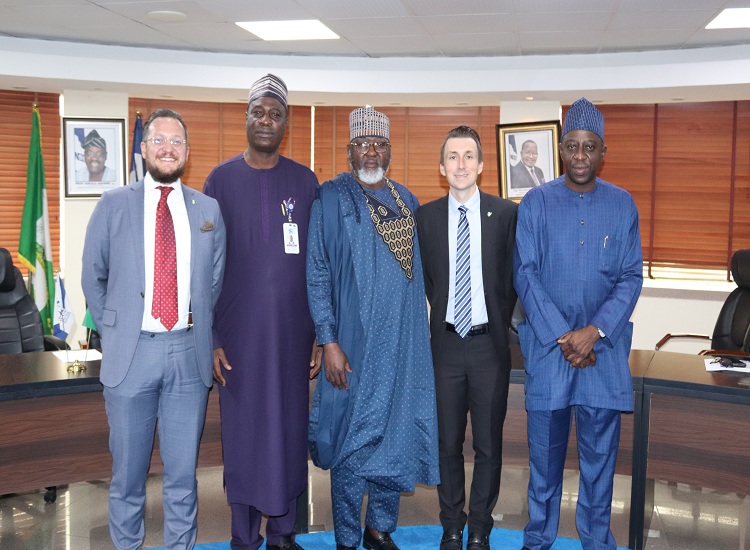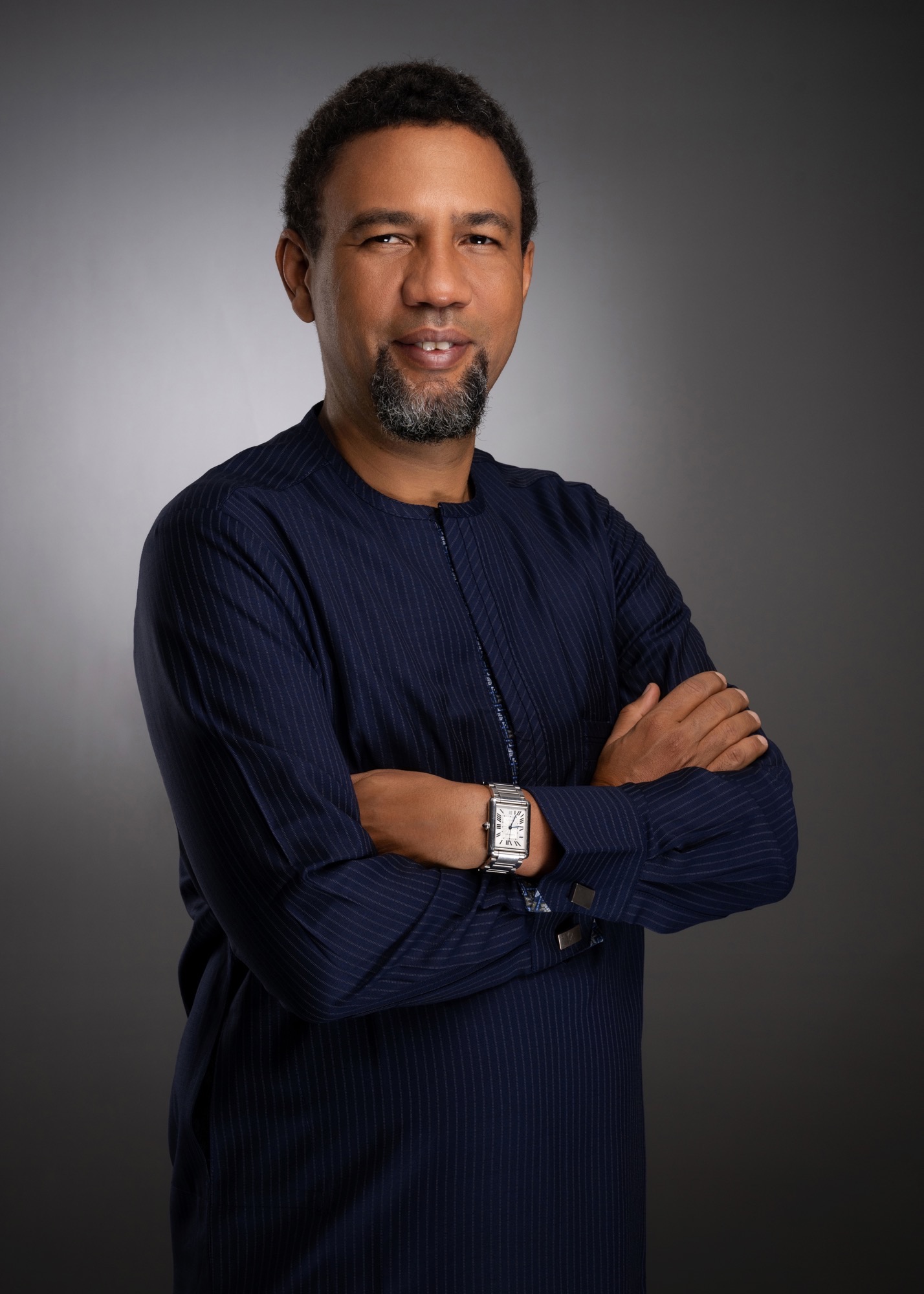Telecom
NCC to Balance Competition with Disruptive Technologies for Sustainable Telecoms Growth

The Nigerian Communications Commission (NCC) has emphasised that in light of disruption in the technology world, it is keen on balancing healthy competition with entry of disruptive technologies to ensure sustainable telecoms industry growth and development in Nigeria.

Prof. Umar Garba Danbatta, Executive Vice Chairman (EVC) of NCC, stated this during a presentation to the Commission by a delegation from SpaceX, an American aerospace manufacturer and space transportations services company, in Abuja on Thursday, May 6, 2021.
SpaceX is in the process of launching a low-earth orbiting (LOE) constellation of satellites to provide low latency, high bandwidths Internet to all corners of the globe and has identified Nigeria as a critical market.
SpaceX has been in discussion with NCC virtually over the past several months to begin the process of pursuing all necessary licenses to bring Starlink, its satellite-based broadband services to Nigeria.
Having made substantial progress in the discussion, the Commission granted SpaceX’s request for a face-to-face discussion to gain better insights on the prospects of their proposal.
Led by SpaceX’s Starlink Market Access Director for Africa, Ryan Goodnight and supported by the company’s consultant, Levin Born, the company provided an overview of its plans, expectations, licensing requests and deployment phases during the meeting.
After the presentation by SpaceX team, the Executive Commissioner, Technical Services, NCC, Ubale Maska, who stood in for the EVC, said NCC will work on necessary modalities to ensure that it balances the need for healthy competition vis-a-vis the entry of new technologies, in order to protect all industry stakeholders.
“As the regulator of a highly dynamic sector in Nigeria, the Commission is conscious of the need to ensure that our regulatory actions are anchored on national interest.
“We have listened to your presentation and we will review it vis-à-vis our regulatory direction of ensuring effective and a sustainable telecoms ecosystem where a licensee’s operational model does not dampen healthy competition among other licensees,” Maska told the SpaceX delegation.
Maska further stated that the Commission is interested in making necessary regulatory efforts to drive the coverage of rural, unserved and underserved areas of the country through the accomplishments of the lofty targets contained in the Nigerian National Broadband Plan (NNBP), 2020-2025.
He noted that the plan’s target of 70 per cent broadband penetration target, covering 90 per cent of the population by 2025 is also in line with government expectations in the National Digital Economy Policy and Strategy (NDEPS), 2010-2030.
Other Senior Management staff of the Commission, at the briefing include the Executive Commissioner, Stakeholder Management, Adeleke Adewolu; Director, Licensing and Authorisation, Mohammed Babajika; Director, Technical Standards and Network Integrity, Bako Wakil; Director, New Media and Information Security, Dr. Haru Alhassan and Director, Spectrum Administration, Oluwatoyin Asaju, among others.
Section 70 (2) of the Nigerian Communications Act (NCA), 2003, empowers the Commission to regulate the provision and use of all satellite communications services and networks, in whole or in part within Nigeria or on a ship or aircraft registered in Nigeria.
This is for the purpose of ensuring a well-developed and organised satellite communications market with appropriate legal framework that meets international best practices, encourages innovation, promotes competition and guarantees public safety in the rendering of commercial satellite services.
Telecom
NCC Claims to Have Eliminated Unregistered SIMs from Telecoms Networks

Nigerian Communications Commission (NCC) has said that it has successfully eliminated users of unregistered subscriber identity modules (SIM), from the Nigerian telecommunication network, a development that can boost national and cyber security.

Eng. Aminu Maida, executive vice chairman of NCC,
Eng. Aminu Maida, executive vice chairman of NCC, who disclosed the information at a media briefing in Abuja on Monday, said, however, that it was beyond the scope of the agency to control the names with which some customers used in registered their SIMs.
The NCC CEO pointed out that while the commission had successfully removed unregistered SIMs from its network, some strange names being attached to some of the subscribers reflect what the owners used while registering with their operators.
“No unregistered SIM is operating on the network as of today, but there may be people using names they did not register with, apparently to mask their identities. We cannot control the names attached to each SIM, as they reflect what the owners used at the time of registration with their respective operators,” the EVC said.
“While NCC cannot control that behaviour, it is to be noted that it is an offence to use fake names to make or receive calls in Nigeria,” Maida warned.
The EVC, however, said that the commission has put necessary measures in place to ensure sanity and stability in the industry so that every user can determine the best network operator to patronise based on performance, service delivery and charges.
He said the commission would, in September this year, launch a public map to show subscribers which of the telecoms networks provides the best service and tariff plan to determine which to patronise based on their locations.
Mr. Maida said for the industry to make the required progress and serve the interests of the people, there is a need for a fresh injection of capital from outside the industry, adding that the commission had already revised a series of good governance guidelines to guide operators in the industry.
According to him, the guidelines are aimed at promoting transparency, accountability and boosting investors’ confidence and customers’ trust in the industry.
He said, “The need for good corporate governance guidelines requires that operators in the industry must provide audited reports to boost investors’ confidence and earn the trust and confidence of their customers”.
The ECV explained that the commission approved the recent tariff hike for the industry due to the fact that there had not been any cost-reflective tariff adjustment for a decade, adding that the commission was mindful of the need to protect the interests of both the operators and Nigerian subscribers.
On the issue of threats to telecoms infrastructure nationwide, the EVC announced that he would soon meet with governors to discuss the need for them to team up with NCC to protect telecoms infrastructure in their domains and to also eliminate multiple taxes on the operators so as to improve service delivery and ensure national security.
Telecom
Aliyu Aboki Applauds Broadband Mapping as About Expanding Opportunity in Africa

The West Africa Telecommunications Regulators Association (WATRA) has commended Nigeria for its exemplary leadership in broadband infrastructure mapping, following the successful ITU Africa Broadband Mapping (BBMaps) National Event recently held in Abuja.

The national event marked a key milestone in the pilot phase of the Africa-BB-Maps initiative, a flagship project of the International Telecommunication Union (ITU), implemented with funding from the European Union. The four-year (2025–2028) programme aims to support eleven Sub-Saharan African countries, including Nigeria, in establishing harmonized national broadband mapping systems to accelerate digital development and investment.
WATRA’s Strategic Engagement
Representing WATRA at the event, Mr. Ruffus Samuel, Principal Manager for Partnerships, contributed to a high-level session titled “Context and Current State – Intervention by International Partners”. WATRA highlighted the importance of broadband mapping harmonization across West Africa, stressing its potential to serve as a foundation for smart regulation, infrastructure investment, and regional digital integration.
WATRA Executive Secretary Aliyu Yusuf Aboki reaffirmed the organisation’s commitment to working closely with national regulators such as the Nigerian Communications Commission (NCC) to promote coordinated approaches to infrastructure mapping.
“Nigeria’s robust and transparent broadband mapping system stands as a model for the West African region,” said Mr. Aboki. “Through data-driven policymaking, we can close connectivity gaps and lay the groundwork for an inclusive digital economy.”
Nigeria’s Role as Regional Leader
The event spotlighted the NCC’s broadband mapping framework as a leading example for Africa. Participants from across the continent acknowledged the NCC’s technical capacity and policy foresight, underscoring Nigeria’s growing role in shaping regional ICT strategy.
The opening ceremony was presided over by Dr. Aminu Maida, Executive Vice-Chairman and CEO of the NCC, with notable participation from:
- Dr. Cosmas Luckyson Zavazava, Director, ITU Telecommunication Development Bureau
- Zissimos Vergos, Deputy Head of EU Delegation to Nigeria
- Inga Stefanowicz, Head of Green and Digital Economy, EU Delegation
- Senior representatives from ITU, ECOWAS, and national stakeholders
Key Recommendations and Outcomes
- Stakeholders recommended the creation of a National Broadband Mapping Task Force chaired by the NCC to coordinate data standards, governance, and updates.
- WATRA emphasized the importance of regional interoperability and pledged continued engagement with ITU, NCC, and development partners.
- The event underscored the necessity of collaboration among governments, regulators, infrastructure owners, and technical partners to ensure the reliability and usefulness of broadband data.
Toward Regional Digital Transformation
The Africa-BB-Maps initiative is aligned with the Africa–Europe Digital Regulators Partnership and the EU Global Gateway Strategy, both of which promote sustainable digital infrastructure development and cross-border cooperation. WATRA plays a critical role in translating these goals into actionable frameworks for its 16 member states.
“This initiative is more than mapping—it’s about enabling investment, expanding opportunity, and achieving our collective digital aspirations,” Mr. Aboki concluded.
Telecom
MTN Group Restructures Executive Team, Appoints Toriola VP for Francophone Africa

MTN Group has announced a restructuring of its executive leadership team to strengthen the implementation of its Ambition 2025 strategy and drive long-term growth across key markets.

The telecommunications giant disclosed this in a statement on Monday, noting that the changes are aimed at enhancing operational efficiency and accelerating digital inclusion across Africa.
According to the statement, Dr Karl Toriola, Chief Executive Officer of MTN Nigeria, has been appointed Vice President for Francophone Africa, effective Nov. 1, 2025.
He will oversee operations in Cameroon, Côte d’Ivoire, Benin and Congo Brazzaville, while retaining his role as CEO of MTN Nigeria.
MTN said the appointment reflects its confidence in Nigerian leadership and underscores Nigeria’s strategic importance to the Group’s overall success.
Under Toriola’s leadership, MTN Nigeria became the first telecommunications company to attain ₦10 trillion in market capitalisation, driven by strong financial performance, innovation and operational excellence.
Toriola previously served as Vice President for West and Central Africa between 2015 and 2021, overseeing 13 countries.
Commenting on the development, MTN Group President and CEO, Ralph Mupita, said the leadership changes would support the accelerated execution of the Group’s strategy beyond 2025 and enhance value creation for stakeholders.
“These changes illustrate the depth of talent and experience across the Group,” Mupita said.
The restructuring aligns with MTN’s strategic focus on three core platforms: Connectivity, Fintech and Digital Infrastructure.
The Group said it is intensifying efforts to expand home broadband services, simplify digital offerings, scale financial services through a digital-first approach, and invest in fibre networks, data centres and AI-driven efficiencies.
MTN reaffirmed its commitment to leading digital solutions for Africa’s progress, noting that the leadership evolution is a key step towards achieving its long-term vision.

 Telecom1 day ago
Telecom1 day agoNCC Launches Nationwide Campaign to Defend Nigeria’s Digital Lifelines

 General News1 day ago
General News1 day agoNCC Moves to Protect Consumers, Enforce Accountability in Telecoms

 General News1 day ago
General News1 day agoSamsung Launches the Sleek and Durable Galaxy A07 in Nigeria

 News1 day ago
News1 day agoCAC Delists 247 Firms Over Invalid Registration Claims

 Telecom1 day ago
Telecom1 day agoGufwan Commends NCC for Sensitisation Workshop on Digital Citizenship for Persons with Disabilities

 General News1 day ago
General News1 day agoNGF Plans Investopedia to Showcase Investments in 36 States

 Telecom11 hours ago
Telecom11 hours agoNCC Claims to Have Eliminated Unregistered SIMs from Telecoms Networks

 General News11 hours ago
General News11 hours agoVirtual Reality in Healthcare: Nigeria’s Untapped Opportunity for Training, Patient Care, and Medical Innovation













